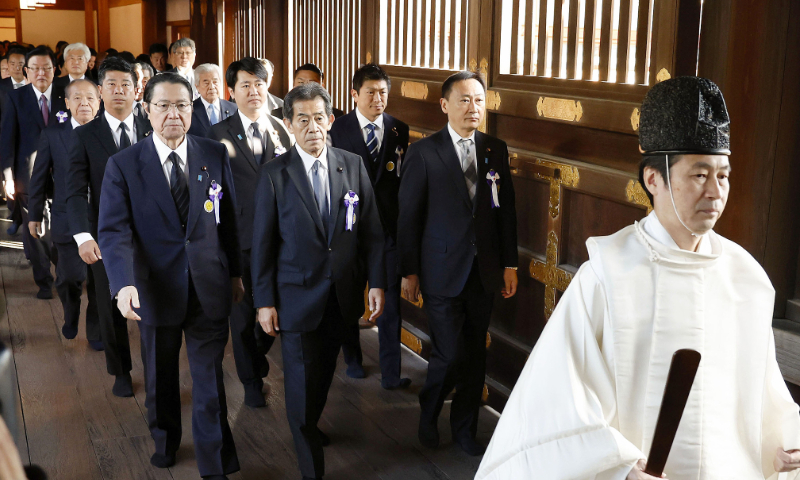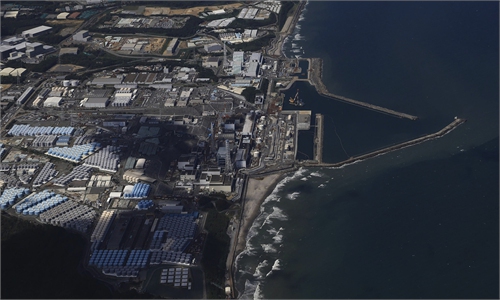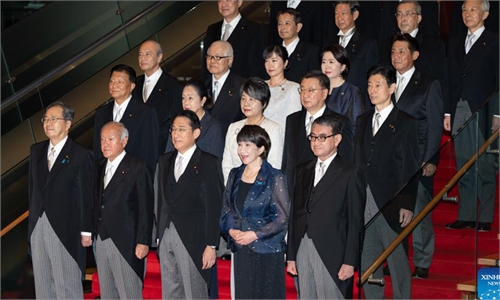Japan warned not to become 'destabilizing factor' in Asia-Pacific following latest offering at notorious Yasukuni Shrine

A cross-party group of Japanese lawmakers visit the notorious war-linked Yasukuni Shrine in Tokyo on October 18, 2023. Photo: VCG
After Japanese PM Fumio Kishida sent a ritual offering on Tuesday for the fall festival at Tokyo's notorious war-linked Yasukuni Shrine, a symbol of the country's past militarism, a group of 96 Japanese cross-party lawmakers collectively visited the shrine on Wednesday. The act was slammed by Chinese observers as backpedaling against peace and trying to glorify the war with a twisted historical view.
According to the Kyodo News report on Wednesday, members from the Japanese ruling Liberal Democratic Party (LDP), Japan Innovation Party, Constitutional Democratic Party, Seijika Joshi (female politicians) 48 Party, and other parties participated in the visit to the shrine, which enshrines Class-A war criminals who symbolize Japan's war atrocities and militarism during World War II.
The last collective parliamentary visit was on August 15, the "End of the War Day," Kyodo News reported.
Kishida on Tuesday sent a "masakaki" offering on the first day of the festival, but he is unlikely to make an in-person visit during the three-day event, as in recent years all Japanese leaders have refrained from doing so when in office.
Chinese experts said this sneaky move aims to avoid further angering surrounding countries including China and South Korea which suffered from Japanese aggression in the past, as a visit to the shrine by the Japanese prime minister would escalate diplomatic frictions, but it also caters to the ring-wing forces within the LDP. They noted it shows Kishida is also sticking close to right-wing forces, and exposes the dangerous trend of Japan's views on its war history.
Cabinet ministers also visited the shrine, including Minister of Economic Revitalization Yoshitaka Shindo.
Mao Ning, spokesperson for the Chinese Foreign Ministry, said on Tuesday that the Yasukuni Shrine is a spiritual tool and symbol of Japanese militarists' war of aggression and it honors 14 convicted Class-A war criminals.
"China firmly rejects Japan's negative moves concerning the Yasukuni Shrine and has lodged démarches to the Japanese side," Mao stated, urging Japan to reflect on its history of aggression, make a clean break with militarism and earn the trust of its Asian neighbors and the international community.
Separately, South Korea expressed disappointment and regret on Tuesday that Kishida sent an offering to the shrine. "We urge the responsible Japanese leaders to squarely face up to history and show through action a humble reflection and genuine repentance for the past," South Korean Foreign Ministry spokesperson Lim Soo-suk said on Tuesday.
Experts pointed out that a Japan that sticks to historical revisionism will continue to be viewed as "non grata" by its neighboring countries, and its ties with those countries are unlikely to be mended. Instead of reflecting on its own wrongdoings, Japan is going astray by seeking to revise its pacifist constitution and boosting its military expenditure, and also tagging along with the US to create more threats for regional security, said the experts, who urged Japan to be cautious and not become the "guilty person of Asia" again.
In recent years, the proliferation of Japan's militarism and its growing military buildup have been undermining the international order established since World War II, said Lü, noting that Asian countries must all remain highly vigilant.
Japan amended its national security strategy documents in December 2022 and called China its "biggest strategic challenge," paving the way to lifting its purely defense capability and breaking the constraints of its pacifist Constitution.
Based on Japan's history of invading neighboring countries, either glorifying the war or refusing to admit the war was an act of provocation will surely trigger other Asian countries' antipathy toward it, Da Zhigang, director and research fellow with the Institute of Northeast Asian Studies at the Heilongjiang Provincial Academy of Social Sciences, told the Global Times on Wednesday.
Japan's twisted historical views that still treat South Korea and other countries as its colonies, as well as Japanese politicians' reluctance to recognize its war atrocities, won't help improve its ties with other Asian countries, experts said.
Japan should not become a "destabilizing factor" in the Asia-Pacific, with its defense policies getting more aggressive and its foreign policies following the US' anti-China strategy, according to Chinese experts.
In addition to denying the past, Japan is now following a more dangerous path of reviving its militarism, with Tokyo boosting its defense budget and attempting to amend its pacifist constitution. It is also serving as a vassal of the US, as well as provoking China on issues including the Taiwan question, Da warned.


